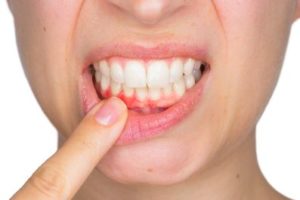Receding Gums and Sensitive Teeth? Tips From a Dentist in Southlake!
April 20, 2018
 Do you completely avoid certain foods because it’s painful or uncomfortable to eat them? If so, you may suspect that the root of the problem (no pun intended!) is your teeth. However, it could actually be that your receding gums have exposed the roots of your teeth, which are much more sensitive.
Do you completely avoid certain foods because it’s painful or uncomfortable to eat them? If so, you may suspect that the root of the problem (no pun intended!) is your teeth. However, it could actually be that your receding gums have exposed the roots of your teeth, which are much more sensitive.
Since our gums protect much of our tooth structure, any problem with them can ultimately put our teeth at risk for a wide variety of problems. As a dentist in Southlake, we’ve helped many of our patients learn how to prevent receding gums and treat any sensitivity they may have. Keep reading to learn more!
What Causes Gum Recession?
First, we’ll review a bit of tooth anatomy to help you understand the impact of gum recession. A tooth has two main parts: the root and the crown, which is the white portion of the tooth that you see above the gumline.
The crown is covered with enamel, an extremely hard substance that protects the sensitive inner layers of the tooth where the nerve resides.
Since gum tissue normally covers the roots, they are not covered with enamel.
If the gum tissue has receded, it exposes the unprotected roots, so things like pressure and cold temperatures can easily trigger a painful nerve response.
Unfortunately, once the gums have receded, they won’t return to where they were without a procedure called gum grafting. In severe cases, a dentist in Southlake might recommend grafting to return the gumline to its former position.
In less severe cases, the most effective thing to do is prevent the gums from receding further and treat any root sensitivity you may have.
How Can You Prevent Gum Recession?
There are several factors that can contribute to receding gums:
- Brushing too hard – This is a very common cause but can be a hard habit to break! An electric toothbrush that gives you feedback about the pressure you’re using is a wonderful way to help you “lighten up.”
- Clenching and grinding – Talk to your doctor about a night guard that can help protect your teeth and gums from the effects of grinding.
- Genetics – Clearly you can’t do much about this one, but if other people in your family struggle with receding gums, being careful about brushing pressure and clenching or grinding is particularly important.
How Can You Reduce Sensitivity?
If you have root sensitivity, try these two things:
- Sensitivity toothpastes – These products contain ingredients like potassium nitrate that can protect the roots. The effects are cumulative, so you may not notice a difference for 2-3 weeks.
- Fluoride – Topical fluoride will not only strengthen soft root surfaces and prevent cavities, it also puts a protective coating over them so that stimulants like cold or pressure don’t reach the nerve as easily. Your dentist can prescribe a high fluoride toothpaste to use at home and can also apply a professional fluoride varnish at every checkup.
Sensitivity is no fun, but with these guidelines, you’ll know how to keep your gums in great shape and better protect your teeth!
About the Author
Dr. J Lee Pettigrew is an award-winning general, restorative and cosmetic dentist who understands the impact that dental sensitivity can have on his patient’s lives. He always takes the time to educate his patients about gum health to help them prevent sensitivity as much as possible. If you have any questions, he can be reached via his website or at (817) 481-4888.
No Comments
No comments yet.
RSS feed for comments on this post.
Sorry, the comment form is closed at this time.
